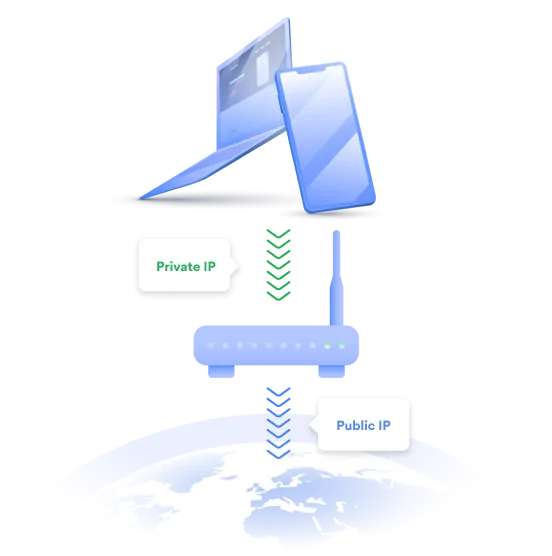
What is my IP address location? Find out here
Quickly See My IP Address and My IP Location
What is an IP address?
Your internet service provider assigns a numeric label, called the Internet Protocol (IP) address, to identify your device among billions of others. In a way, an IP address functions as an online home address because devices use IPs to find and communicate with each other.
Here’s how an IP address directs data to its destination. First, you type in a website name (example.com) into the browser. However, your computer does not understand words — only numbers. So it first finds out the IP address of that website (example.com = 103.86.98.1.), finds it on the web, and finally loads it on your screen.
How to find my IP address
Finding your IP address is pretty easy.
IPv4 vs. IPv6 addresses
How an IP address looks depends on the Internet Protocol version it’s using — IPv4 or IPv6.
IPv4
Most internet service providers still use IPv4. It’s based on 32 binary bits, consists of four numbers from 0 to 255, and is separated by dots. For example, 103.86.98.1.
However, IPv4 can generate only 4.3 billion unique IP addresses. That’s nowhere near enough in this digital age — IPv4 addresses will soon run out.
IPv6
IPv6 addresses are made up of 8 blocks of numbers. Each block is written as four hexadecimal digits and separated by colons. For example, 2400:BB40:1100:0000:0000:0000:0000:
0001.
Number groups containing only 0 are often omitted to save space. Instead, a colon is added to indicate the gap. For example, 2400:BB40:1100::1.
Why hasn't IPv6 been fully implemented yet?
Unlike the IPv4 protocol, IPv6 won’t ever run out of unique IP addresses — it can provide nearly 3.4×10^38 of them. Furthermore, some argue that IPv6 is a more efficient technology, providing better quality and connectivity.
However, IPv6 has not been fully implemented for two reasons:
1. IPv6 isn’t backward compatible with IPv4. You can’t access IPv4 websites if your device runs on an IPv6 protocol.
2. It’s hard to adopt the new technology without immediate gain. IPv4 still suits our needs, and until we reach its limit, a worldwide shift is unlikely.
Public vs. private IP addresses

When you ask “what is my IP address” or “what is my ipv4 address” you usually mean “what is my public IP.” It’s the IP address provided by your internet service provider. Devices on the same network share this IP address when accessing the internet.
Take your home network as an example. It’s made up of your computer, phone, tablet, and every other device on your router. When these devices connect to the internet, they use the public IP address that’s been assigned to the router.
Routers assign private IPs to each device on their network, so that devices can identify and find each other. When these devices connect to the internet, their private IP addresses remain hidden, and only the public IP addresses of routers are visible. And your public IP address can say a lot about you. A simple IP lookup can reveal your location and ISP or even help track down your identity.






